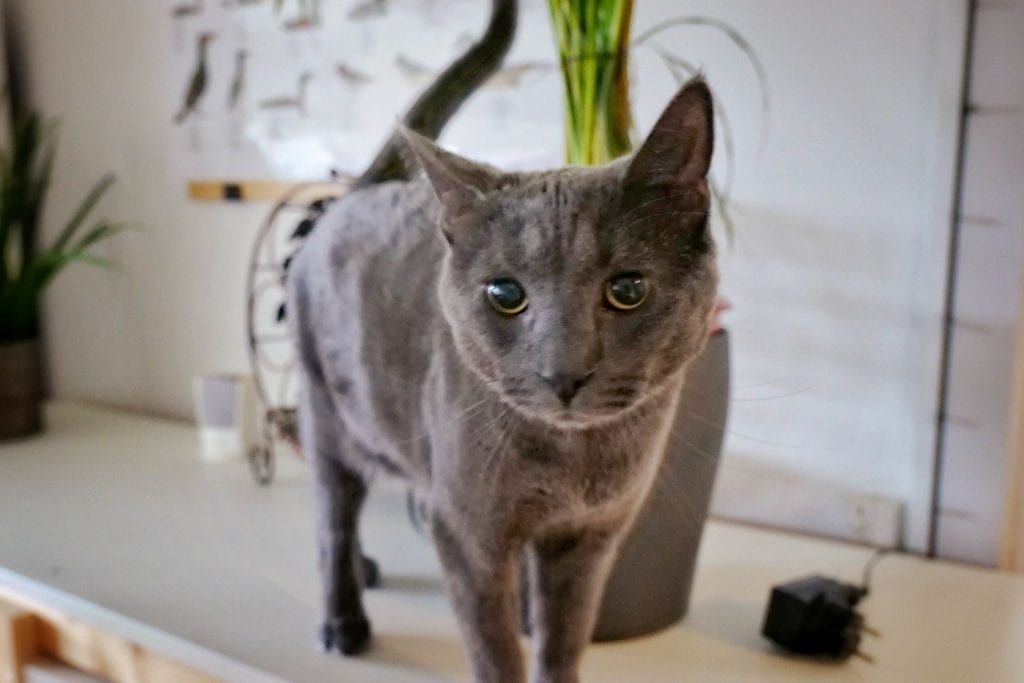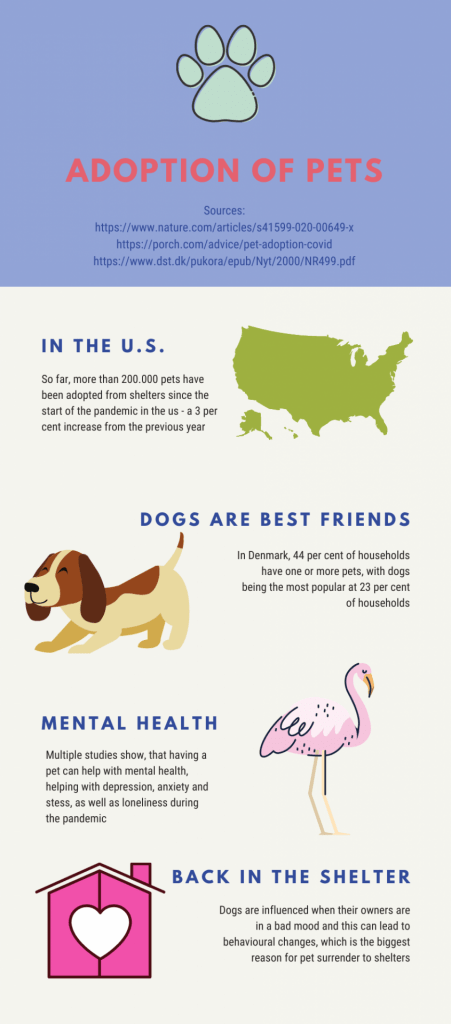The pandemic has led to a surge in the number of animals being adopted, and shelters report ‘running out of animals. But experts and shelters are worried that people are being too irrational and end up giving the animals back, once things get back to normal.
By Isidora Hernández, Margarita Ilieva and Nina Schaumann

By now, it’s been a year since the start of the COVID-19 pandemic, which has inflicted most of us in one way or another. We spend more time at home, working at our desk, not being able to go out to eat, shop and socialize. And this can lead to us feeling more lonely, depressed or anxious, among other things. For some people, the solution is to adopt pets, and more pets are being adopted now and in 2020 than what has been seen in previous years.
A lot of shelters across the world are reporting that they are in dire need of animals, something that sounds like positive news. But this also has it’s negative sides, with the threat that some people, who adopted or bought an animal in desperation and without further thought behind it, don’t know how to care for the needs of the animal, with some people ending up sending the animal back to the shelter, once the pandemic is over.
Why we adopt
Soledad Torres is a Veterinary ethologist of animals, specialising in dealing with animals and their behavioural problems, and owner of CONCIENCIA Etología Clínica.
“I always ask the owners why they decided to adopt. Many people have good intentions, however, some people adopt animals to help themselves” says Torres.
This is an interrogation that has emerged since the beginning of the pandemic. Many adoption shelters and organizations question the real intentions behind adoptions, especially after the increase during the lockdown. The expert explains:
“The reasoning behind an adoption should be to maintain this bond, take into account the bond with the animal, the emotional well-being of the pet”.
Torres is emphatic in pointing out that adoption should not be taken lightly. She says:
“It’s a huge responsibility that not many people take seriously. If one puts more thought into it, the adoption rate would change radically”.
Because even if most people have good intentions, there are a lot who decide to adopt out of boredom. That’s a problem, Torres explains, because when you are no longer bored you can’t just get rid of the animal you adopted, it can cause them severe mental and physical damage.
“If we knew from childhood, what it means to keep a pet, we would stop seeing dogs and cats as objects or extensions of our lives,” says the ethologist.
This is incredibly important if we take into consideration that animal welfare organizations across the world saw a spike in adoptions during the pandemic. Even TIME magazine chose rescued animals as Pet of the Year 2020.
“Many people hold the idea that having a pet is a custom or a right, this is not the case. They should learn that having a pet is a privilege”, states Torres, who believes that everybody who wants to adopt an animal must consider all the responsibilities implied.
“People who adopt should always act from love”
Constanza Reveco and her partner Giare Papagallo already had a little dog named Arya when they decided to offer their house as a temporary home for a rescued greyhound called Marla. The couple knew they wanted to help a foundation called Greyhound’s Chile after they met a neighbour who had adopted a rescue greyhound named Black. They knew that because they live in a small apartment, permanently adopting wasn’t an option. Despite this, they genuinely wanted to help so the foundation offered them this temporary adoption opportunity.
“They take care of this specific breed of dogs that suffer specific abuse because they usually force them to be racing or hunting dogs, they are neglected and abandoned… I did not know about this case and I was quite moved” says Giare Papagallo, who believes that this motivated the temporary adoption.
The couple put a lot of thought into the decision and believe it was a good one.
“We are helping Marla in her physical and psychological recovery so that she regains confidence in people and is ready for permanent adoption…This is the best option for us as a family, to be able to work with this foundation that does a very important job” reflects Papagallo.
One of the couple’s fears was that they would get too attached and it has definitely been a challenge.
“I think that one of the challenges was not knowing how to take care of her, it was trial and error. Marla has never had a home, so it is not normal for her to live in this space, she doesn’t know how to follow rules,” Reveco says.
But when they feel frustrated she says that they have to remember what a change they are making in Marla’s life.
“People who adopt should always act from love, adopted animals have a lot of trauma and are not always easy to deal with. At that moment one must be patient and remember that it is an animal that has suffered and that if you act from love you are changing its life,” Reveco declares.
According to Gigi Hernández, a veterinary ethologist of animals from Chile, when adopting an animal, it is exposed to significant emotional stress. There are several factors that influence the direction, in which the emotional state may develop after the adoption.
“Different factors may be important in developing a stress response. The stress response will depend on whether or not the animal can adapt to an environment and if the fact of adapting will have negative consequences for him as any alteration of their behaviour or their emotional well-being,” Gigi Hernández explains.
However, being surrounded by people, who direct their time and affection towards the animal is helping them adapt to the new environment.
“Although changes are never easy for any species and always generate stress at the beginning, the fact that the adopted animal has the exclusive care of a determined group of people […] is always good and they go in benefit of the whole group,” Hernández explains.
A new pet from Facebook
The time factor is one of the major ones for most people when it comes to deciding to adopt an animal, which seems to be strongly benefiting from the current COVID-19 situation. So did it also in the case of Eva Guldbrandsen, who is a medical student in Aarhus, Denmark, and has adopted her cat Allan in September 2020.
“I’ve always thought that I might get a pet at some point. I wrote my roomies the day before that I’ve thought about getting a cat for a while before that, like, not that long, maybe like a month or something more serious. And then it sort of just happened, that I saw Allan and thought that he was so cute and I’m gonna get that cat,” she says with a big smile on her face while petting her furry friend.
What has brought them together was a Facebook group about pets, that are given for free from their owners. This turns out to be another popular way of animal adoption in Denmark. According to Eva she has seen many posts of people, who are searching for a new home for their companions due to time reasons.
Adoption – an (ir)reversible decision?
“I got Allan from a woman, who didn’t have time for him anymore […] because she had her kid and she usually shared the time with the dad and now she had the kid all the time, so she didn’t have time for Allan anymore. He was just a little kitten, so… yes, she didn’t have him longer than a few weeks at that point,” Eva shares about the experience.
However, an environmental shift like that is a cause of major stress for the animal, according to Gigi Hernández. For her, it’s not only the moral principle of not harming animals but also understanding the helplessness the animal is exposed to due to the sudden changes is essential, since they produce fear and a bad emotional state.
“The change of routines, detachment from the family that had adopted you can have negative consequences relevant to their mental state, as it is important for all animals to have a level of control over their environment,” Hernández points out.
For Eva having more time and not being able to physically visit her university brought her to making the decision to adopt her cat earlier than planned:
“I think Corona might have had something to do with it. I think it was a good time to get a pet, cause you have more time for the pet. And he was young, he was just a kitten at that time, you know, he has more energy and needs to be taken care of. So I thought it was a good time to be able to be with him as well.”
Eva is yet another example of someone, who has found happiness in the company of an animal during the pandemic, and as for the future, she is certain that Allan has found his forever home.
